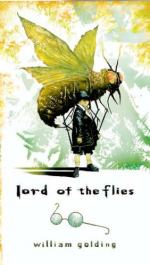|
This section contains 746 words (approx. 3 pages at 300 words per page) |

|
A Study of Conflict in The Lord of the Flies
Summary: Explains the theme of good vs. evil in the novel Lord of the Flies by William Golding, a classic tale of English schoolboys. Presents evidence of conflict in the characters, settings and text. Analyzes the dichotomy of good versus evil
The central concern of The Lord of the Flies is the conflict between two competing instincts that exist within all human beings: the instinct to live by the right rules, act peacefully, and follow moral commands. Of course the other instinct is totally opposite, act violently to obtain domination over others, and enforce ones will. This conflict might be expressed in a number of ways: civilization vs. savagery, order vs. chaos, reason vs. impulse, or the broader heading of good vs. evil. Through this novel, Golding associates the instinct of good with civilization and the instinct of evil with savagery.
The conflict between the two instincts is the driving force of the novel, explored through the separation of the young English boys' civilized, moral, disciplined behavior as they familiarize themselves to a wild, brutal, barbaric life in the jungle. As the novel progresses, Golding shows how different people...
|
This section contains 746 words (approx. 3 pages at 300 words per page) |

|


